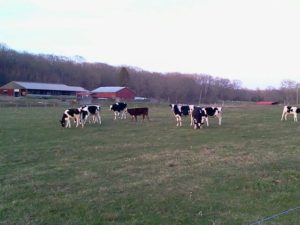This post was produced with Addee Kim, WLA’s Intern.
According to the Connecticut Department of Agriculture, as of 2015, the state’s Farmland Preservation Program has preserved more than 46,000 acres on 315 farms.

There has been great progress since the program’s inception, but the goal to preserve 130,000 acres is still out of reach and the future of a healthy agricultural sector and the availability of fresh, local food in Connecticut is still at risk.
One great barrier to the further success of the program is the personal income tax that farmers incur when selling the development rights of their land to the state.
Paul Enconin, director of Land Conservation Weantinoge Heritage Land and member of the Working Lands Alliance Steering Committee, works directly with farmers in Connecticut who want to put their land into conservation. “One of my landowners [I work with] is a retired woman in her 70s who suffered a mild stroke. She wants to see her land protected but can’t afford to donate it.” Enconin explained.
For someone like Enconin’s landowner, who wants her 35 acres of prime agricultural land in Bethlehem conserved and brought back into farming production, selling the rights to develop her land through an agricultural conservation easement is an incredible opportunity. But she still faces barriers in the tax code of the state. “Every dollar that a farmer has to pay in taxes to the state’s purchase of development rights is a dollar that they can’t use to invest in the farm to purchase equipment, pay employees, and retire.”
Currently, the portion of the sale of development rights paid to the state is significant enough that it can make or break a landowner’s decision to protect their land– especially if they are already financially strapped. The high average age of non-operating landowners and farmers in Connecticut continues to grow and figuring out a plan for the future of their land is not a decision that should exacerbate the emotional strain of retirement and estate planning. “Every dollar to someone at her age is precious because it goes towards retirement,” Enconin said about the non-operating woman landowner.
Landowners could be significantly incentivized to conserve their land if the state passed legislation that would exempt farmland owners from paying personal income tax on the proceeds from the sale of their agricultural development rights. Senator Eric Berthel introduced such legislation this legislative session with Senate Bill 208 – An Act Exempting from the Personal Income Tax Proceeds from the Sale of Agricultural Land Development Rights to the State. Unfortunately, this important piece of legislation did not pass out of the Revenue, Finance, and Bonding Committee. However, If the bill had passed it would have allowed farmland owners to protect their lands and not pay personal income tax on the sale of their agricultural development rights.
Despite this bill not leaving committee this session, the proposed bill is receiving its due recognition by conservation champions in the state’s House and Senate. Rep. Arthur O’Niell, 69th district, explained why he sees the importance of SB 208, “Encouraging people to protect agricultural lands from future commercial development by eliminating the state income tax proceeds on those parcels for which development rights are sold to the state will preserve the bucolic, pastoral areas of Connecticut well into the future.” He continued, “Many times private developers are able to pay substantially higher prices for land than the state, and this bill would allow sellers to receive comparable value while conserving our natural areas. If passed, this bill would save the state money, reduce the seller’s tax burden and be a benefit to all parties involved. It’s a win-win.”
This important piece of legislation will encourage more farmland owners to participate in the state’s Farmland Protection Program and protect their farms forever. Working Lands Alliance is committed to increasing the number of acres and farms that are protected in the state. We are excited this bill was introduced this session and will build on this session momentum to make sure it passes in 2020.




